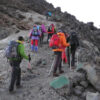Tips and recommendations for travelers
Travel Tips
Preparing for Your Trip to Tanzania
- Gather Copies and Electronic Copies of Essential Documents:
- Ensure you have both physical and electronic copies of vital documents, including your passport, driver’s licenses, and a yellow fever vaccination certificate.
- Complete Necessary Vaccinations:
- Prior to your journey to Tanzania, make sure to get all required vaccinations.
- Verify International Card Usability:
- Check that your credit and bank cards are valid for use abroad. Inform your bank about your travel plans in advance and keep handy their contact numbers in case your card is misplaced or blocked.
- Pack Essentials in Your Carry-On:
- Be sure to include essential items in your carry-on luggage. Avoid packing prohibited items in your hand luggage.
- Prepare for Possible Luggage Delays:
-
Ensuring a Safe Stay in Tanzania
Tanzania is known for its safety and tranquility, but it’s wise to exercise common travel precautions, just as you would anywhere else:
- Avoid Displaying Large Sums of Money:
- Refrain from showcasing large amounts of cash. When exchanging money or using an ATM, count your funds in a secure and private location before leaving, never on the street.
- Secure Expensive Equipment:
- If you’re carrying valuable items like a large camera or laptop, especially at night, consider using a taxi for transportation. Most hotels offer secure lockboxes or the option to leave valuable belongings at the reception desk.
- Use Registered Taxis:
- Only utilize registered taxis, easily identifiable by their white license plates and clear registration numbers, typically painted on each door. In Dar es Salaam, Arusha, and Moshi towns, official taxis are typically white cars with green lettering. When exploring town, you can request a taxi through Moria Safaris or your hotel.
- Access to Tourism Police:
- In Arusha and Zanzibar, there is a dedicated Tourism Police Force to assist and support tourists. If you encounter any issues, Moria can help you connect with this specialized force.
- Safe Currency Exchange:
- Avoid street money exchanges. Tanzania has recently enacted laws regarding foreign currency exchange, so it’s best to exchange money only at authorized bureaus or banks.
- Request Official Receipts:
- Every legitimate business in Tanzania possesses a tax number and offers official receipts. When making purchases, always ask for an official receipt. While some local craft markets may not provide receipts, it’s advisable to buy handmade items and gifts from locations recommended by your tour guide. You may even have a dedicated day for souvenir shopping, during which your driver-guide will take you to a reputable craft market offering authentic goods.
While Climbing Kilimanjaro / Meru
-
Practical Tips for Mountain Trekking
- Leave Valuables Behind:
- Avoid bringing valuables like laptops and smartphones on your mountain trek. These items are susceptible to damage from extreme weather conditions. Charging electronics can also be challenging during the trek. Rest assured, all guides are equipped with phones and radios for communication.
- Stay Hydrated:
- Aim to consume 3-4 liters of water daily to expedite the high-altitude adaptation process and alleviate unpleasant symptoms.
- Prepare for Leisure Time:
- Most mountain hikes occur in the morning, leaving the afternoons free. Consider bringing a book, MP3 player, cards, or other forms of entertainment to enjoy during these moments of relaxation.
- Show Appreciation with a Tip:
- Express your gratitude to your climbing team by leaving a tip, preferably at the office upon your return, if you’ve had an exceptional experience. This approach facilitates equitable distribution among the guides, cooks, and porters. Of course, if you have specific preferences for distributing the tip, we are happy to accommodate them. The recommended amount for an expedition is approximately $200-250 per person, to be shared among the entire expedition team.
While on Safari
Tips for Ngorongoro and Safari Packing
- Prepare for Chilly Mornings and Nights:
- Ngorongoro can get quite cold in the early morning and at night. If you’re planning to visit this renowned site, be sure to pack warm layers like trousers and a fleece jacket.
- Pack Wet Wipes:
- Wet wipes are a handy, travel-friendly solution, especially during the high season when dust can be a concern.
- Bring Extra Clothes:
- Consider bringing spare clothing, ideally a fresh set for each day of your journey.
- Opt for Natural Tones on Safari:
- Avoid wearing bright colors on safari, as they don’t help you blend in with nature during activities like walking safaris or bush drives. Additionally, bright colors tend to show dust easily. Ideal safari attire includes khaki, dark green, and neutral hues.
- Invest in Quality Camera Equipment:
- A high-quality camera with specialized lens attachments can make a significant difference in capturing stunning photographs. Don’t hesitate to equip yourself for those unique wildlife shots.
- Consider Tipping Practices:
In Zanzibar
-
Etiquette and Tips for Zanzibar
- Respect Local Culture:
- Zanzibar is a major tourist destination, but it’s important to keep in mind that the majority of the population adheres to conservative Muslim values. When exploring Stone Town or venturing beyond your hotel, opt for modest clothing. While it’s acceptable to wear bathing suits at the hotel pool or private beach, both men and women should don attire that covers the knees and, for men, includes a shirt, when dining at restaurants or going shopping. Displays of affection in public, such as kissing, should be avoided, but hand-holding is generally acceptable.
- Be Cautious with “Beach Boys”:
- Beware of individuals often referred to as “Beach Boys” who may offer services along the beach in front of your accommodation. These individuals may lack an official office or boat, and dealing with them can sometimes lead to overspending. For a safer and more reliable experience, it’s advisable to book tours or excursions through legitimate, recommended companies. Your hotel can assist in finding a reputable service provider instead of relying on unfamiliar individuals.
- Handle Persistent Sellers Politely:
- Occasionally, you may encounter someone who is insistent on selling you something, even when you’ve politely declined. In Tanzania, as in many places, it is considered impolite to pressure someone after they have declined an offer. You have several options in handling such situations: you can firmly refuse, simply ignore them and walk away, or politely ask them to leave you alone.Similar to the hospitality industry worldwide, tipping is appreciated and often expected in Tanzania. For safari guides, it’s customary to offer $40-60 per day, per vehicle. In hotels, a tip of $1-2 is sufficient when porters assist with your baggage, and modest tips in the restaurant for waitstaff are also appreciated.
- Respect Local Culture:
-
- Prepare for Chilly Mornings and Nights:
- Express your gratitude to your climbing team by leaving a tip, preferably at the office upon your return, if you’ve had an exceptional experience. This approach facilitates equitable distribution among the guides, cooks, and porters. Of course, if you have specific preferences for distributing the tip, we are happy to accommodate them. The recommended amount for an expedition is approximately $200-250 per person, to be shared among the entire expedition team.
- Leave Valuables Behind:
- Every legitimate business in Tanzania possesses a tax number and offers official receipts. When making purchases, always ask for an official receipt. While some local craft markets may not provide receipts, it’s advisable to buy handmade items and gifts from locations recommended by your tour guide. You may even have a dedicated day for souvenir shopping, during which your driver-guide will take you to a reputable craft market offering authentic goods.
- Avoid Displaying Large Sums of Money:
-


